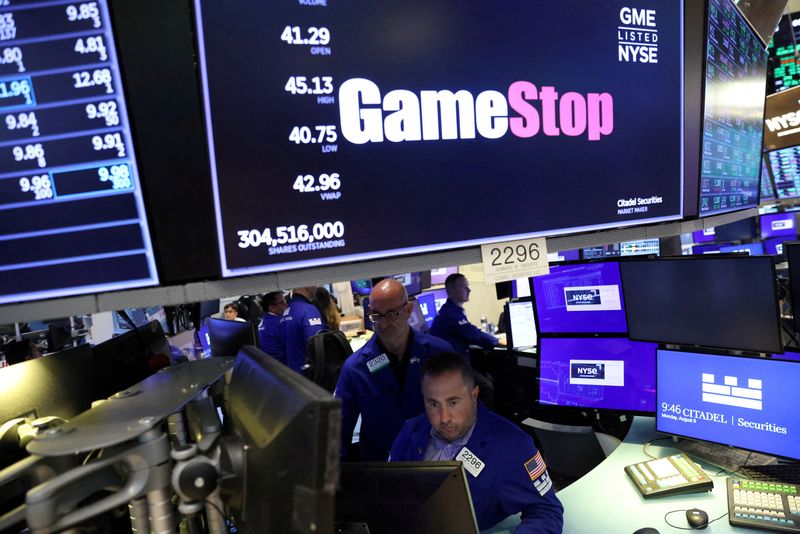U.S. stocks fell sharply Monday amid growing concerns over an economic slowdown, with technology stocks hit particularly hard.
At 09:40 ET (13:40 GMT), the Dow Jones Industrial Average fell 1,070 points, or 2.7%, the S&P 500 dropped 188 points, or 3.5%, and the NASDAQ Composite slumped 810 points, or 4.8%.
Slowdown fears batter Wall Street
These hefty losses followed on last week’s selloff on fears of an economic slowdown.
A string of weak readings ramped up concerns that the Federal Reserve had kept interest rates at elevated levels for too long, and that chances of a soft landing for the economy were fading.
This notion came to a head on Friday after nonfarm payrolls data for July missed expectations by a wide margin, indicating a substantial cooling in the labor market.
While the data did drive up hopes for more interest rate cuts by the Fed, it drained any appetite for risk-driven assets.
More economic cues ahead
There is more economic data due out Monday, including the July ISM Services PMI, and investors will be looking for more clues as to the strength of the world’s largest economy, after Friday’s official jobs report raised the specter of recession.
Chicago Federal Reserve President Austan Goolsbee stated on Monday that the central bank is prepared to respond to signs of economic weakness, hinting that current interest rates may be too prohibitive.
When asked about whether a weakening labor market and manufacturing sector might prompt action from the Fed, Goolsbee avoided committing to a specific course but mentioned it doesn’t make sense to maintain a “restrictive” policy stance if the economy is softening.
The US stock volatility gauge — the VIX Index — exceeded the 40 handle earlier on Monday, climbing to the highest level since October 2020, noted Bloomberg.
The index has risen as much as 79%, the most since February 2018, and has hit its highest intraday level in four years.
“We have increased our 12-month recession odds by 10pp to 25%,” said analysts at Goldman Sachs in a note, though they thought the danger was limited by the sheer scope the Fed had to ease policy.
Markets now price in a 78% chance the Federal Reserve will not only cut rates in September, but ease by a full 50 basis points.
High profile earnings continue
Most of the mega cap companies have already reported, but there are still some high-profile earnings results expected in the coming days.
Industrial bellwether Caterpillar (NYSE:CAT) and ride sharing major Uber Technologies (NYSE:UBER) are due on Tuesday.
Super Micro Computer (NASDAQ:SMCI), which saw a major valuation spike on hype over artificial intelligence, is also due on Tuesday, while media majors Walt Disney (NYSE:DIS) and Warner Bros Discovery (NASDAQ:WBD) are due on Wednesday.
Before these numbers, Apple (NASDAQ:AAPL) stock fell over 6% after Warren Buffett’s Berkshire Hathaway (NYSE:BRKb) unloaded nearly half of its stake in the iPhone maker as part of a broader selloff of stocks.
Nvidia (NASDAQ:NVDA) stock fell 12% after reports of a delay in the launch of the chipmaker’s upcoming artificial-intelligence chips due to design flaws.
BioNTech (NASDAQ:BNTX) stock fell 3% after the drug maker’s second-quarter earnings fell short of estimates amid a continued slide in sales of its COVID-19 vaccine.
Crude slumps on growth concerns
Crude prices fell Monday, trading around eighth-month lows, on mounting concerns of an economic slowdown in the U.S., the world’s largest oil consumer.
By 09:40 ET, the U.S. crude futures (WTI) dropped 0.9% to $72.86 a barrel, while the Brent contract fell 0.7% to $76.27 a barrel.
Weak U.S. economic data last week has hit sentiment in the oil markets as the prospect of a recession in the world’s largest economy bodes poorly for future demand, even as recent inventory data showed that increased travel demand during the summer season had kept fuel consumption high.
This has added to disappointing growth numbers from top oil importer China and surveys showing weaker manufacturing activity across Asia and Europe, raising concerns of the future oil consumption.
(Ambar Warrick contributed to this article.)



